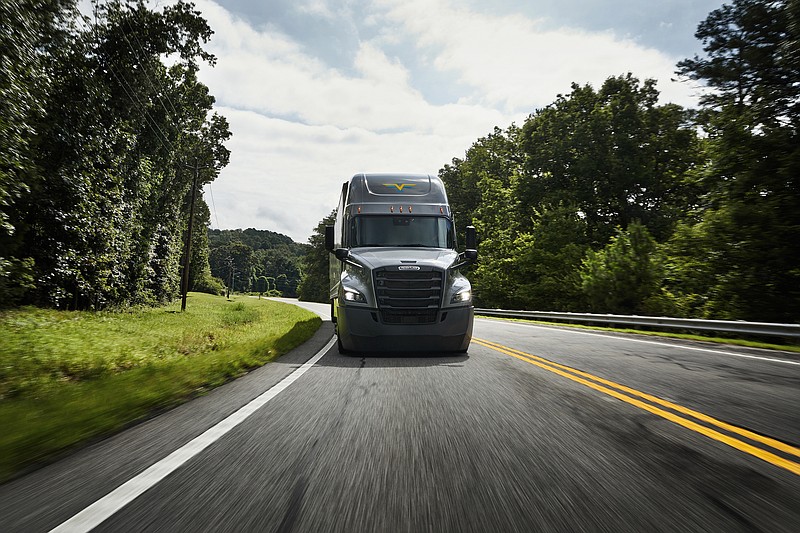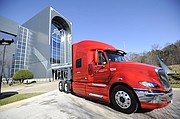When Eric Fuller took over U.S. Xpress from his father, Max, in 2017, the younger Fuller began taking steps to improve freight efficiency and lower driver turnover at Chattanooga's biggest trucking company and one of the nation's largest long-haul trucking companies. But Fuller soon became convinced a whole new approach was needed, and he decided to create a new venture in Atlanta's tech hub to help build it.
Fuller created U.S. Xpress Ventures, an internal business unit focused on developing and implementing new asset-based business models and technology strategies. In April 2019, Fuller hired the former chief technology officer of UPS-owned Coyote Logistics, Cameron Ramsdell, to build Variant, which quickly grew to become the fast-growing digital truckload business that Fuller anticpates will become U.S. Xpress's main growth platform.
In its first year, the Variant test model proved impressive, with its fleeting running about 20% more loaded miles per week and driver turnover about 70% below the overall industry average.
"The ultimate goal would be full cannibalization of our legacy model, that we have built a model that is far superior to anything that we have ever had or maybe even that the industry has had,'" Fuller told an investor conference hosted by investment bank Stephens Inc. in December 2021.
But building a new business approach to shipping and logistics is not without setbacks. As Variant grew in 2021 to more than 1,500 tractors and the company invested $34.2 million into the subsidiary last year, the initial results didn't hold up as well.
Two weeks before Christmas, U.S. Xpress fired Ramsdell and brought the previously independent division within the U.S. Xpress operations team after Variant's turnover, utilization, and revenue per tractor began to deteriorate in the second half of the year. Operational problems at Variant led to disappointing financial results for U.S. Xpress in the fourth quarter of 2021 and pushed the company's stock down. The company reported an operating loss of $5.1 million compared to an operating income of $15.1 million in the same quarter of 2020.
"We built Variant purposely outside of U.S. Xpress with a team that had technology expertise, but not necessarily trucking expertise, and provided them with a mandate to build a technology-enabled fleet," Fuller says. "For most of Variant's history, this framework was successful, as the fleet grew rapidly and produced a better experience for drivers and customers while enhancing utilization, safety and revenue per tractor. However, as Variant began to achieve significant scale, we found that the team needed to shift their focus from idea generation to execution to ensure that the fleet ran smoothly while maintaining its superior operating metrics."
Photo Gallery
New road: U.S. Xpress harnesses technology to improve driver experience with Variant model
In early January, Dustin Koehl, a senior vice president of sales at U.S. Xpress who has been with the company for 15 years, was named to lead Variant. Koehl typically spends Monday through Wednesday at the Variant facility near Georgia Tech in Midtown Atlanta where Variant has about 150 technology specialists recruited from primarily outside of the trucking industry to help develop new ways to boost freight optimization.
Koehl says the $800 billion-a-year trucking industry, including the $400 billion-a-year over the road market, remains highly fragmented with no major market leaders. Variant seeks to use technology to improve the efficiency of truck shipments and to improve both the income and schedules of drivers.
"I get really excited about pressing into the opportunities, or what I would call the brokenness, in our industry," he says. "We're really trying to re-engineer the people aspect of our business to be able to use technology to provide the consistency in this free marketplace to allow drivers a better quality of life by being home more often.
"Our industry, since its inception, has really treated drivers like cattle or commodities and we're set out to treat our driver community like people and engage them with technology to achieve more success and a better job."
Optimizing driver efficiency
At Variant, U.S. Xpress has developed a new suite of machine learning and artificially intelligent algorithms called the Variant Optimizer, which is designed to cut operating costs and boost driver satisfaction through "operations specialists," rather than fleet managers. Variant's fleet orchestration platform known as Vector uses interconnected algorithms to analyze current and forecasted truck positions, telemetrics data and drivers' current and forecasted hours of service to better connect and utilize shipper orders. Vector is connected to live freight markets via application programming interfaces (APIs) and other middleware help strategically position Variant trucks to best satisfy demand.
Vector also helps re-orchestrate the Variant fleet in response to weather delays, mechanical problems, shipper order changes and even drivers' behavior. In the process, Variant drivers enjoy more mileage and paycheck predictability and get home more on the dates of their choice.
"Our promise to our driver community is to get them 2,500 miles a week.," Koehl said. "That's about a $75,000 annual compensation offer."
Fleet managers at Variant have been replaced with operations specialists who are free to provide drivers with more personalized one-on-one contact while the company's Optimizer software bears the heavy load of route planning. Response times to drivers typically are handled within two minutes. Drivers interact with Optimizer through a multifunction app.
Variant also has launched an Ambassador program to help build a more connected driver community. Long-haul trucking may be a one-person job, but through the Variant Ambassador program, drivers share their Variant experience with other drivers and invite them to join their Squad. As the Variant Squad grows, so will driver paychecks, much like other multi-level marketing concepts.
Variant
* Started: 2019* Owner: U.S. Xpress Enterprises* Location: Midtown Atlanta office develops technology and new systems* Size: Over 1,600 tractors currently and Variant expects to have 2,500 drivers by year end* Products: The Variant Optimizer is designed to cut operating costs and boost driver efficiency through the platform known as Vector that uses interconnected algorithms to analyze truck positions and orders, among other factors in real time.
Already, about one fourth of the Variant drivers have joined the Ambassador program "and we're working hard on ways to scale that program over the next couple of years," Koehl said.
The Variant operation has grown from a startup to more than 1,600 tractors in just two years and Koehl says he expects to have 2,500 drivers with Variant by the end of the year. Within the growing company, there are now about 250 drivers that help bring greater connections and service to keep drivers on the road and limit driver turnover, Koehl said.
"Most of our competitors are downsizing their over-the-road fleet, but we have made a commitment to grow that even with some big headwinds," Koehl says. "I think we are now in this second season of Variant where, to some degree, it's been said we over-indexed on technology. But now we're bringing that humanization of technology and people together to really enable us to scale this operation."
Koehl is deeply connected to innovative technologies transforming the trucking industry, including partnerships with the Massachusetts Institute of Technology and its FreightLab program, which finds solutions for greater efficiency in logistics. He also oversees strategic partnerships with autonomous vehicle developers to bring to market self-driving technology and is currently vice chair of the Autonomous Truck Committee with the American Trucking Associations (ATA).
"We will continue to operate, grow, and improve Variant from our Atlanta location and expect Variant to continue to be the main growth engine of our Truckload fleet in coming years," Fuller says.
READ MORE
* How we got here: Chattanooga's road to logistics dominance

